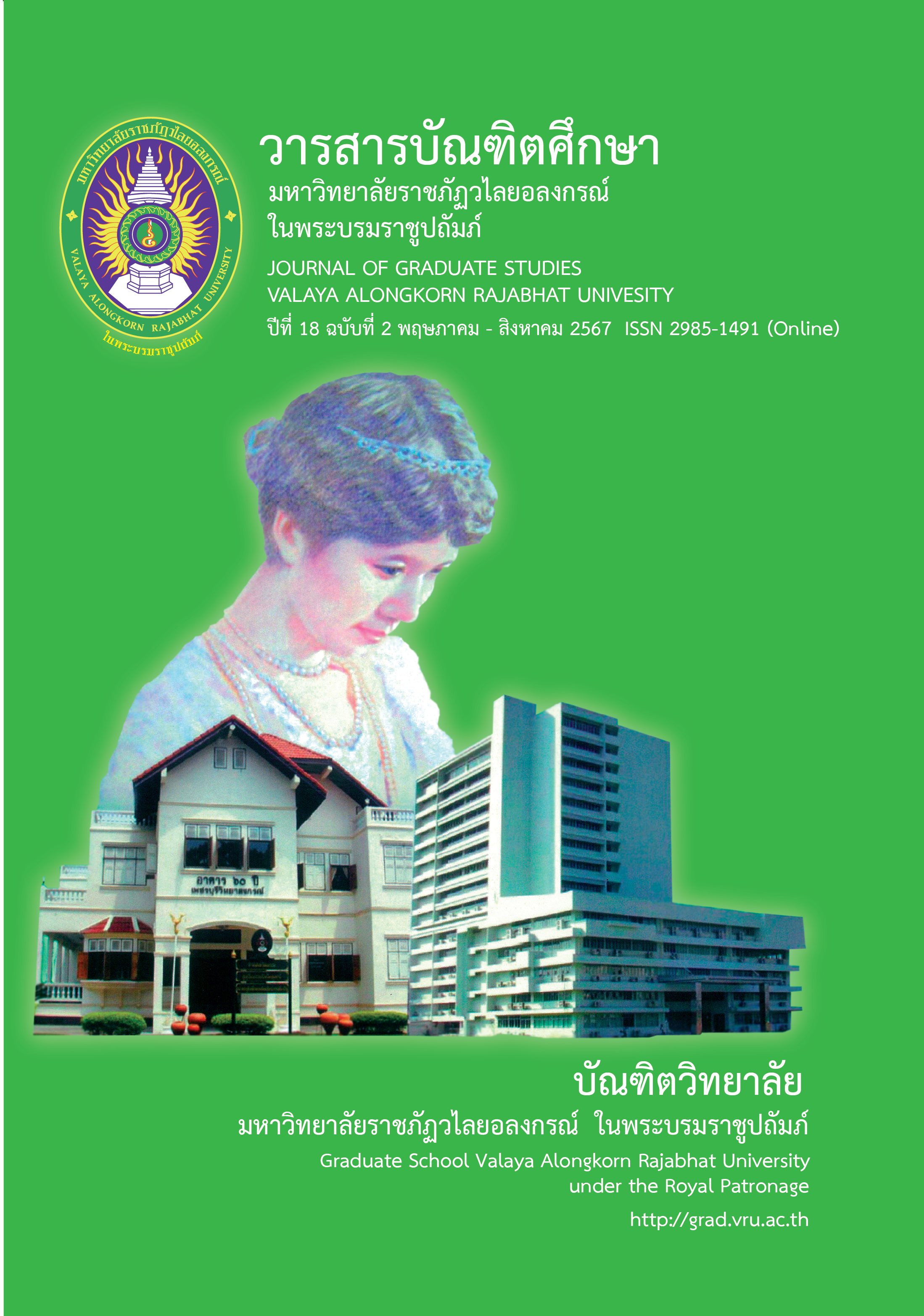THE DEVELOPMENT OF BLENDED LEARNING USING ONLINE LEARNING WITH PROJECT-BASED LEARING TO ENCOURAGE TEAM-WORK’ UNDERGRADUATE STUDENTS
Main Article Content
Abstract
The objectives for this research were to 1) construct and find the quality of blended learning using online learning with project-based learning, and 2) evaluate Teamwork’ undergraduate students who were leaned blended learning using online learning with project-based learning to encourage team-work’ undergraduate students. The samples were 35 students who undergraduate student’s major computer education from Naresuan University who enroll in subject 374324 Administration and Management Computer-Center Education on first semester in 2022. The data were collected by employing 1) five lesson plans on learning activities, 2) evaluation forms plan on lesson plans 3) evaluation forms Teamwork’ undergraduate students and analyzed by using percentage, mean and standard deviation.
The findings were as follows: 1) lesson plans of Blended learning using online learning with project - based learning consisted of 5 lesson plans by all have learning management process include five steps as follows: (1) Prepare (2) Operation include (1) define problem (2) Planning (3) Operation (4) Conclusion (5) Present and (3) Evaluation and the result of lesson plans of Blended learning by online learning with project -based learning were appropriate at the highest level. And 2) Teamwork’ undergraduate students overall were at the highest level
Article Details

This work is licensed under a Creative Commons Attribution-NonCommercial-NoDerivatives 4.0 International License.
บทความทุกเรื่องได้รับการตรวจความถูกต้องทางวิชาการโดยผู้ทรงคุณวุฒิ ทรรศนะและข้อคิดเห็นในบทความ Journal of Global of Perspectives in Humanities and Social Sciences (J-GPHSS) มิใช่เป็นทรรศนะและความคิดของผู้จัดทำจึงมิใช่ความรับผิดชอบของบัณฑิตวิทยาลัย มหาวิทยาลัยราชภัฏวไลยอลงกรณ์ ในพระบรมราชูปถัมภ์ กองบรรณาธิการไม่สงวนสิทธิ์การคัดลอก แต่ให้อ้างอิงแหล่งที่มา
References
Bernath, R. (2012). Effectives approaches to blended learning for independent schools. Retrieved from https://www.testden.com/partner/blended%20learning%20for%20independent%20schools.PDF
Chantra, P., Yuangsoi, P. & Teeraputon, D. (2017). kān rīan kānsō̜n phān wep dōi chai kānrīanrū bǣp khrōng ngān phư̄a songsœ̄m kānthamngān pen thīm [Web-based instruction with project-based promoting for teamwork]. Academic Services Journal, Prince of Songkla University. 28(1), 109-117.
Damjub, W. (2019). sư̄ sangkhom ʻō̜nlai kap kānrīanrū nai satawat thī yīsipʻet [Social media for teaching and learning in the 21st century]. Journal of Liberal Arts Maejo University. 7(2), 143 – 159. Retrieved from https://so03.tci-thaijo.org/index.php/liberalartsjournal/article/view/232338
Ministry of Education. (2017). sœ̄msāng sakkayaphāp kānthamngān pen kānrīanrū thī chư̄am yōng kap [National Digital Learning Platform samrap prathēt Thai [National Digital Learning Platform]. Retrieved from https://opendata.nesdc.go.th/dataset/reseach-0309-1
Naresuan University [NU]. (2017). phǣn phatthanākān sưksā mahāwitthayālai Narēsūan chabap thī sipsō̜ng (Phō̜.Sō̜. sō̜ngphanhārō̜ihoksip 2564) [Division of planning, office of the president of Naresuan University]. Phitsanulok: Naresuan University. Retrieved from http://www.oic.go.th/FILEWEB/CABINFOCENTER39/DRAWER004/GENERAL/DATA0000/00000012.PDF
Office of the Education Council. (2014). thalǣng nayōbāi khō̜ng khana ratthamontrī [The royal gazette]. Retrieved from http://www.ratchakitcha.soc.go.th/DATA/PDF/2557/E/180/1.PDF
Office of the Education Council. (2021). nǣothāng kān songsœ̄m thīm [The synergy teamwork for education]. Retrieved from https://www.moe.go.th/เสริมสร้างศักยภาพการทำ/
Saelow, W., Yuangsoi, P. & Roungrong, P. (2022). kānphatthanā kān rīan kānsō̜n ʻō̜nlai dōi rūpbǣp TPACK phư̄a songsœ̄m kānthamngān pen thīm samrap nisit parinyā trī [The development of TPACK model online instruction to promote team work for undergraduate students]. STOU Education journal. 15(2), 102 – 116. Retrieved from https://so05.tci-thaijo.org/index.php/edjour_stou/article/view/255891
Thungkanai, K. (2020). kānrīanrū bǣp phasomphasān Blended Learning nai withī New Normal [Blended learning in a new normal]. Journal of Educational Studies. 15(1), 29 – 43. Retrieved from https://edujournal.bsru.ac.th/publishes/18/articles/318
Yaungsoi, P. (2011). kānphatthanā rūpbǣp kān rīan kānsō̜n bǣp phasomphasān phư̄a songsœ̄m thaksa kān kǣ panhā dūai lak ʻariyasat nai kāntham khrōng ngān samrap naksưksā radap parinyā trī [The development of the blended instructional model to encourage problem - solving skills in the line of ariyasacca principle in project – based assignment for undergraduate students]. Naresuan: N.P.
Yaungsoi, P. (2019). ʻariyasat kap kānrīanrū dūai khrōng ngān nai yuk dičhithan [The four noble truths with project-based assignment in the digital age]. Ramkhamhaeng University Journal: The Graduate School (Educational Technology). 3(1), 1 – 15. Retrieved from http://edtechjournal.ru.ac.th/journals/7_1563176508.pdf


